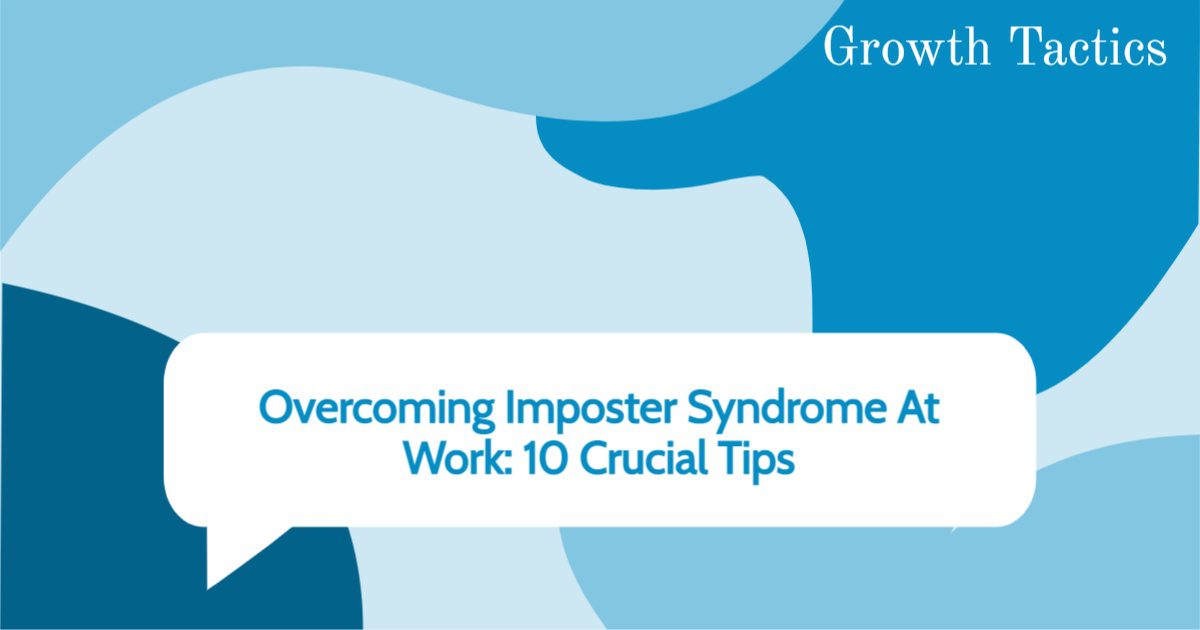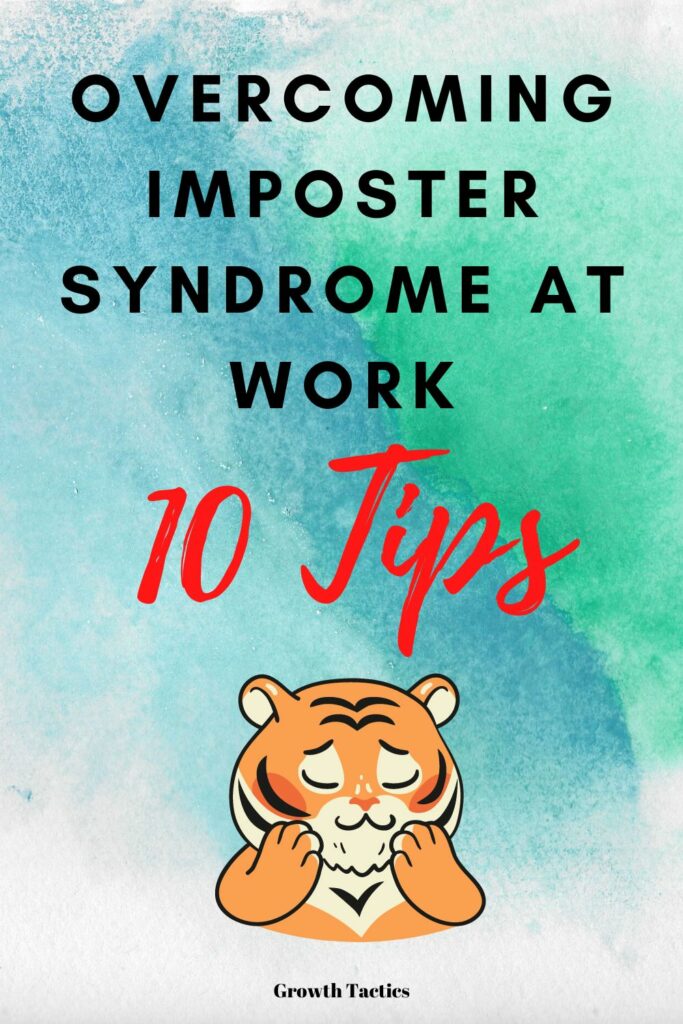Imposter syndrome can actually be a very destructive thought pattern because it makes us second-guess our own abilities and even question our self-worth. So it makes sense that we should all be working to overcome imposter syndrome at work, how do we do this? In this article, we’ll look at some tips for overcoming imposter syndrome at work.
Jump To Section
What Is Imposter Syndrome
Imposter syndrome is a feeling of not being good enough, even when you’re actually very good at your job.
It’s the feeling that you are going to be found out as a fraud, that any moment now they will discover who you really are and fire you. Or worse still, your boss could see right through all your lies and realize that all those accomplishments listed on your resume were actually achieved by someone else. Someone who was in fact better than yourself.
It’s also known as impostorism or fraud syndrome, and if it sounds familiar to anyone working in tech then it may be because this has been dubbed one of the top 10 most dangerous traits for entrepreneurs (according to Forbes).
Types of Imposter Syndrome
There are various types of imposter syndrome, each with its own set of characteristics and triggers. Understanding these types can help you better identify and combat imposter syndrome in your own life. Here are a few common types of imposter syndrome:
- The Perfectionist: This type of imposter believes that everything they do needs to be flawless. They set impossibly high standards for themselves and feel like a fraud if they make even the smallest mistake.
- The Expert: People with this type of imposter syndrome feel the constant need to know everything and be an expert in their field. They fear being exposed as a fraud if they don’t have all the answers.
- The Natural Genius: This type of imposter believes that their success is solely based on their innate abilities. They struggle with accepting that hard work and learning from failure are important parts of the journey to success.
- The Soloist: Individuals with this type of imposter syndrome feel like they have to accomplish everything on their own. They struggle to ask for help, fearing that it will reveal their incompetence.
- The Superwoman/Superman: This type of imposter feels the pressure to do it all and be the best at everything. They constantly compare themselves to others and believe that they must excel in all areas of life.
Signs of Imposter Syndrome
1. Fear of Failure
One of the most common signs is the fear of failure. People with imposter syndrome often feel like they are not good enough and fear that they will fail at any task they take on. This fear can often cause people to hesitate and avoid taking risks.
2. Discounting Achievements
Another common sign is discounting or minimizing achievements. People with Imposter Syndrome may feel like any success they have experienced was just due to luck or timing, rather than their own skills or hard work. They may also avoid talking about their achievements or dismiss any compliments that they receive.
3. Perfectionism
Perfectionism is often seen as a positive trait, but it can also be a sign of Imposter Syndrome. People with this syndrome may set impossibly high standards for themselves, which can cause stress and anxiety and lead to procrastination.
4. Negative Self-Talk
Negative self-talk is another sign of Imposter Syndrome. People with this syndrome may have a constant stream of negative thoughts about themselves and their abilities, which can be self-destructive.
5. Overworking
Overworking can also be a sign of Imposter Syndrome. People with this syndrome may feel like they need to work harder than everyone else to prove themselves, which can lead to burnout and physical and mental health problems.
If you or someone you know is exhibiting any of these signs, it’s important to remember that Imposter Syndrome is a common experience. It’s okay to talk to someone about your feelings and seek support. Remember, you are not alone.
How to Overcome Imposter Syndrome at Work
The following tips will help you overcome your feelings of imposter syndrome at work.
1. Know That You’re Not Alone.
While Imposter Syndrome can feel isolating, you should know that it’s actually a very common experience. In fact, many people have been through what you’re going through right now, and most of them even come out the other side stronger than ever!
You may be able to talk to someone who has experienced imposter syndrome in the past, someone who is currently experiencing it, or even someone who has overcome this feeling altogether. When I’m feeling like an imposter at work, I like to talk things over with my boss or other colleagues whom I trust. Talking about our feelings helps us cope with them better and find ways to move forward.
See Related: How to Learn From Your Mistakes and Grow as a Person
2. Acknowledge Your Feeling of Imposter Syndrome
One way to overcome your feelings of doubt is by acknowledging them instead of ignoring or trying to hide from them. You may be wondering: “How do I acknowledge something when I don’t even know what it is?”
Ask yourself if you’re feeling any doubt about your abilities or competencies. If yes, ask yourself why you feel that way.
Ask yourself if other people have felt this way in the past and how they dealt with it.
3. Reframe Your Thoughts
One way to help yourself overcome this is to use positive self-talk. Positive self-talk helps you reframe your thoughts in a more productive way, which can help improve your confidence and reduce stress.
For example, the next time you find yourself thinking “I’m not good enough for this job,” try saying something like “I’ve been doing great at work so far!” instead.
If you’re feeling really stuck, it might be helpful to write down all of the positive things about yourself that come to mind. It will remind you of what’s working well and give you a sense of pride in your accomplishments.
4. Ask for help when you need it.
If you’re concerned about your ability to perform a task or complete a project, ask for help from someone who has the knowledge and expertise that you lack. This is especially important if you are new to the company or working on a project that requires specialized knowledge or skills.
If your manager is unavailable, consider asking another manager in your department for assistance. You may also want to consult with HR about hiring an outside consultant who can provide guidance on how best to proceed with solving whatever problem it is that’s keeping you from getting started on the work itself. Whether it’s procrastinating during the early stages of planning out specific tasks or feeling overwhelmed by too much self-doubt when trying to get started.
See Related: 13 Tips For a New Supervisor to Get Started On the Right Foot
5. Use a Mentor
Another great method for overcoming imposter syndrome at work is to find a mentor. A mentor is someone who can help you, and it’s usually someone who is more experienced than you are. This person can be anyone from your current boss to a colleague at another company.
The best type of mentor for your situation will depend on how much experience they have compared to you. If you’re an entry-level employee and trying to figure out how the industry works, then it might be best to find someone who has been in your position before. This person can help you understand what steps need to be taken and how things are done in the real world.
If you’re already in a leadership role or have some experience, then it might be better for you to find someone who is more senior than you.
6. Seek Out Feedback
One of the best ways to overcome imposter syndrome is to receive feedback on your work. This can be as simple as asking your boss, “How am I doing?” or it can be more specific, such as asking a colleague what they think about a project you’re working on. If you feel comfortable with someone at work, ask them if they’d be willing to sit down with you and go through your goals for the next quarter or year.
You might also try getting an outside perspective by seeking out friends or family members who know what it’s like in your industry. They’ll probably have some great insight into how well-suited you are for this line of work!
If none of these tips work for you, consider getting an outside opinion from someone in a similar industry. They’ll be able to see things from a different perspective and might suggest some changes that you hadn’t thought of before.
7. Don’t Take Things Personally.
When you’re feeling down on yourself, it’s easy to take things personally. But don’t. People are often unaware of how they come across, or they may have a bad day and say something they don’t mean. Often, feedback is given from a place of frustration, either with themselves or the situation at hand, and not always towards you personally.
Your confidence has nothing to do with what other people think about your abilities. It comes from within. From knowing that even if everyone else thinks you’re terrible at something and gives up on you altogether, deep down inside there’s still that voice telling you that YOU’RE AWESOME AND EVERYTHING WILL BE OKAY!
8. Trust Your Work, and Trust Yourself as a Person Who Is Working Hard and Doing Their Best
One of the most important things you can do is to trust your work and yourself as a person.
You might be wondering: “Should I just trust that everything will turn out well?” No, it’s not that simple. You need to trust that you are doing your best and working hard in spite of any feelings of uncertainty or anxiety.
When we’re feeling like an impostor, it’s easy to think that our work isn’t good enough and that we should be able to do more. Instead of letting these thoughts get in the way of doing good work, try focusing on what’s right in front of you. The task at hand and trusting your ability to accomplish what needs doing, even if it feels challenging at times.
Trust yourself as a person who is working hard and doing their best because this will help build confidence over time!
See Related: How to Be a Highly Successful Introverted Leader
9. Take Time off to Relax and Recharge
Taking time off to do things you love is a great way to recharge and come back stronger than ever. You can take a break from work. But if you need an actual vacation, don’t feel like you need to justify it. Ask for one! And if your boss doesn’t grant your request? That’s okay. There are other ways to unwind without leaving work behind completely.
Consider spending time with friends and family, or doing something that makes you happy, like playing video games or going shopping. If there are any hobbies that have been pushed aside because of all the new responsibilities at work (and in life), now might be the perfect time to pick them up again or try something different!
10. Remember That You Are Amazing and Capable
As someone who has been there, you need to remember that you are amazing and capable. You can do great things in your life. Whether it’s achieving your goals or pursuing the things you want to do. You can achieve the dreams that have been floating around in your mind for years, but never thought were possible because of imposter syndrome!
Reinforce this mindset by writing down a list of all the things that you’ve done so far in life, no matter how small they may seem. It could be something as simple as calling an electrician to fix those flickering lights or making friends with a stranger at work. These are still accomplishments that took effort and courage on your part and you did them! Now take this list out every night before bedtime and remind yourself what an awesome person you really are!
Imposter Syndrome Doesn’t Mean There Is Anything Wrong With You
It is important to remember that imposter syndrome is not a sign of weakness or a lack of ability. It is also not a lack of intelligence or self-awareness. In fact, it can be quite the opposite! Imposter syndrome can be an indicator that you’re working hard and exceeding expectations because if you weren’t doing these things, no one would recognize your accomplishments!
So what does this mean for your job? It means that even though you may feel like an impostor at times, it doesn’t mean there’s anything wrong with you or your abilities. The only thing standing between you and success is overcoming those feelings so that they don’t hold back your career advancement.
Conclusion
If you are struggling with imposter syndrome, don’t worry. You are not alone. Imposter syndrome is a common phenomenon among many people around the world. It can seem like a curse that no one can escape from but following the tips in this article will help you overcome it and make it work for you instead of against you.
Did you enjoy this article on how to overcome imposter syndrome at work? Please share and subscribe below.








